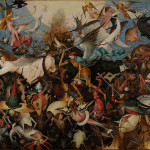We run our website the way we wished the whole internet worked: we provide high quality original content with no ads. We are funded solely by your direct support. Please consider supporting this project.
Six Theses of the Warfare Worldview
The trinitarian warfare worldview seeks to reconcile our experience of radical evil with the conviction that reality is created and sustained by an all-loving, all-powerful God. Six principles form the foundation for this view. These principles are based on Scripture’s account of God’s battle with Satan as well as our experience with the war-zone reflected in the world around us.
1. Love Requires Freedom
By definition, love must be freely chosen. We are able to program computers to obey our commands perfectly, but we don’t consider them “loving.” They lack the capacity for love because they have no choice but to do what we say. Humans would be in the same category as computers if God merely “programmed” our actions. In order for creatures to be loving, they must have the freedom to do otherwise.
2. Freedom Implies Risk
The freedom to choose or reject love constitutes a risk for God. Creatures may make choices that oppose his will for their lives and the lives of others. This risk is illustrated throughout Scripture, beginning with the Garden of Eden. Many of us have experienced the painful consequences of misused freedom in our own lives. God considered love to be well worth the risk inherent in giving his creatures freedom.
3. Risk Entails Moral Responsibility
God’s creatures are held responsible for how they use their freedom. We don’t hold computers responsible when they fail because their failure is ultimately the responsibility of their programmers. They could not do other than what they were programmed to do. Because we are free to choose or reject love, we can be held accountable for how our choices affect those around us.
4. Moral Responsibility is Proportionate to the Potential to Influence
The potential a creature has for love is proportionate to the creature’s potential for evil. The greater the creature’s potential for love, the greater risk their freedom entails, for they may choose to use their potential for evil instead. Greater potential also entails greater responsibility for how the potential is used.
5. Power to Influence is Irrevocable
Genuine freedom must be irrevocable. If it can be revoked, creatures cannot be held responsible for their use of it, nor can they fully realize their potential for love. Within the parameters of the freedom God gives creatures, God must tolerate evil. Since God is omnipotent, he is able to accomplish his will within these parameters without compromising his own integrity or limiting the potential of his creatures by revoking their freedom.
6. Power to Influence is Finite
God’s creatures are finite. Although their freedom cannot be revoked, it can be thought of as “probational.” The scope and duration of their freedom is conditioned by many variables and ultimately determined by God’s will. The warfare between God and creatures who choose to use their freedom for evil is not eternal. Christ will vanquish his enemies in the end and creatures will be completely free to participate in the triune love of God at last.
Category: General
Tags: Spiritual Warfare, Warfare Worldview
Topics: Spiritual Warfare, Cosmic Conflict
Related Reading

Does God Still Heal?
In the ancient world Jesus was known first and foremost as an exorcist and a healer. These two activities are mentioned in every summary of Jesus’s ministry found in the Gospels. It’s common for Western Christians today to accept that infirmities (sickness, disease, injuries, disabilities and deformities) are part of God’s mysterious plan for their…

4 Reasons to Wake Up to the Warfare Worldview
Image by postbear via Flickr A view of the world that grounds the problem of evil in spiritual warfare is not one that many modern people find easy to accept. To many contemporaries, the notion is preposterous that real, semi-autonomous, self-determining, and invisible spirits exist that can and do influence our lives. The whole thing sounds…

Did God Cause the Polar Vortex?
When is this polar vortex thing going to end? It’s March, and even in Minnesota we expect to see temperatures warmer than this. With all of the sleet and cold in the south, it seems like schools are closing more than they are open. While this is not a catastrophic event like a hurricane, tsunami,…

Theology That Accounts for Terrorism
The general assumption of both the Old and the New Testaments is that the earth is virtually engulfed by cosmic forces of destruction, and that evil and suffering are ultimately due to this diabolical siege. Jesus defined himself and his ministry in terms of aggressively warring against Satanic forces. Both he and his disciples recognized…

Lord Willing?
Lord Willing? Wrestling with God’s Role in My Child’s Death, by Jessica Kelley In November 2012, I received one of the most touching emails I have ever received. A young mother named Jessica Kelley explained to me that her four-year-old son had been diagnosed with an aggressive brain tumor. Despite his parents’ and doctors’ valiant…

The Reality of Satan and the Spiritual Realm
A theme that underlies Jesus’ entire ministry is the apocalyptic assumption that creation has been seized by a cosmic force and that God is now battling this force to rescue it. Jesus understood himself to be the one in whom this battle was to be played out in a decisive way. The assumption is evident…
